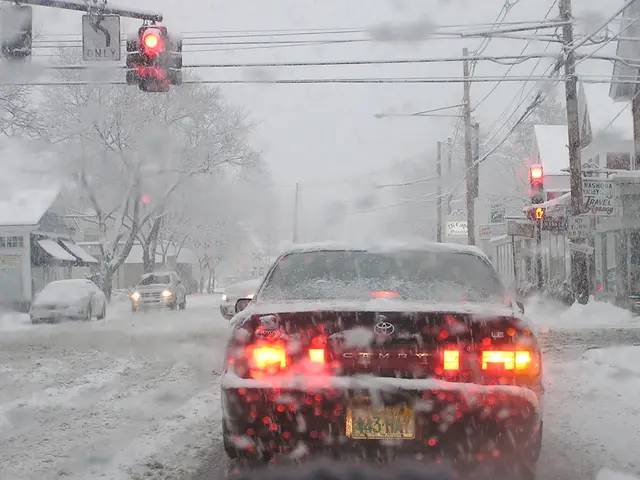Uncovered: Insights into the Alleged Activities
Feeling Scrutinized: Rockland Resident Takes On U.S. Senate Election Results
The quaint town of Sloatsburg, NY, is anything but quiet as its local resident, Diane Sare, instigates a legal battle against the election results for the U.S. Senate in Rockland County. Sare, hailing from the Lyndon LaRouche Party, is joined by two fellow voters, contesting the allegedly unjust vote tabulation by the Rockland Board of Elections.
According to these plaintiffs, a watchdog group known as SMART Legislation, evidence suggests discrepancies and violations of the principle of electoral integrity. Their complaints also question some of the vote totals, specifically in Ramapo districts, which are traditionally dominated by Hasidic Jewish voters.
The fuss over the electoral process isn't light-hearted banter, nor a harmless political squabble. The legal action, filed in the New York State Supreme Court, seeks a hand recount of the thousands of votes for the presidential and U.S. Senate races, a move that could shed light on the validity of the election results.
With Justice Rachel Tanguay overseeing the case, both parties have been ordered to conduct discovery and provide evidence supporting their claims. The next judicial session is scheduled for September 22, marking the start of a detailed investigation into the integrity of the 2024 Rockland County general election.
Lulu Friesdat, founder and executive director of SMART Legislation, declares there are clear signs of issues with the outcomes of votes in Rockland County. She insists a comprehensive public, transparent hand recount is the most effective way to examine questionable ballots and ensure accuracy.
At the heart of the controversy are a handful of disputed ballots, as well as statistical claims regarding these votes for the presidential elections. Affidavits signed by voters reveal missing ballots, according to the lawsuit, with several districts reporting discrepancies between the granted votes and those counted by the Board of Elections.
For instance, in District 39, nine voters swore that they voted for Sare for Senate, yet only five votes were recorded by the Board of Elections. Similarly, in District 62, five voters vouched for casting a ballot for Sare, while only three votes were documented.
The gap between reported and recorded votes is not insignificant, sparking concerns over electoral tampering and mismanagement. The group's analysis of Rockland's voting data cites drop-off irregularities, a measure of the variation in results between the presidential candidate and a major down-ballot candidate of the same party.
Max Bonamente, Ph.D., a professor of physics and astronomy at the University of Alabama, analyzed the Rockland vote data on behalf of SMART Legislation. He found that the results demand extraordinary sociological or political explanations and require further scrutiny to ensure accountability.
Although Sare secured a mere 0.45% of statewide votes and lost to Gillibrand in the Senate race, the lawsuit alleges evidence of statistical irregularities that could have impacted the count. The presidential results in Rockland County showed 83,543 votes for Trump, 65,880 votes for Harris, and 1,316 blank votes. Meanwhile, the Senate race saw Gillibrand receive 72,003 votes (53%) and Sapraicone earn 64,082 votes (47%).
The lawsuit offers two theories to further substantiate its claims. A large positive drop-off indicates an overperformance by a candidate, suggesting that the presidential candidate received an excessive number of votes compared to their down-ballot counterpart. Conversely, a large negative drop-off suggests an underperformance, which could signal that votes are missing from certain candidates' totals.
Some reports claim that the Republican drop-off in Rockland County significantly exceeds that of the 2024 Republican Senate Candidate, signifying that the presidential candidate outperformed their lower-tier party candidates. In contrast, the Democratic drop-off in Rockland County was negative at 9%, a highly unusual phenomenon that was said to be repeated across the state and the country.
In the Ramapo region, traditionally dominated by Hasidic Jewish voters, the results can be skewed. For example, Trump secured a unanimous victory over Harris in Ramapo District 35, which represents the Viznitz Hasidic community, with Harris receiving no votes. Meanwhile, District 35 showed a clear victory for Gillibrand over Sapraicone. These discrepancies between candidates, particularly in areas with large Hasidic Jewish populations, have been raised as potential sources of electoral bias.
County election officials and attorneys have refuted the claims made in the legal action, citing a free and fair election and accurate vote counting. However, the lawsuit challenges these assertions and calls for reforms to election processes to ensure transparency and accountability.
The legal action demands various changes to Rockland County's election procedures, including a full, public recount of all presidential and Senate ballots, a special election for these positions, and increased oversight of the election process by court-appointed monitors. The lawsuit also demands the implementation of best practices to guarantee accurate vote counting and the development of an audit process to count every vote accurately. It also advocates for increased public access to election developments during the investigative process.
This contentious election battle is not only challenging the integrity of Rockland County's voting process but also encouraging an ongoing conversation about electoral transparency and accountability across the country. As the investigation unfolds, citizens can only hope for a clearer understanding of the truth behind the ballots cast in the 2024 Rockland County general election.
- The legal action initiated by Diane Sare and SMART Legislation raises concerns about electoral integrity in the media, as they question the vote totals, particularly in Ramapo districts, amid allegations of discrepancies and violations.
- The lawsuit filed in the New York State Supreme Court, hoping to shed light on the validity of the election results, encompasses not just the U.S. Senate race but also the presidential race, drawing attention to aspects like car-accidents, crime-and-justice, and general-news in the political landscape.
- As the case progresses, policy-and-legislation may significantly be influenced by the findings, as the lawsuit demands changes to Rockland County's election procedures and the implementation of best practices to ensure accurate vote counting and transparency.
- The analyses of voting data reveal statistical claims regarding the presidential elections and drop-off irregularities, raising concerns about potential war-and-conflicts of interest or manipulation during the election process.
- The controversy over the election results has become a critical issue in politics, as it encourages debate around electoral transparency and accountability, bringing attention to the importance of fair elections and the role of business and war-and-conflicts in shaping public opinion.







